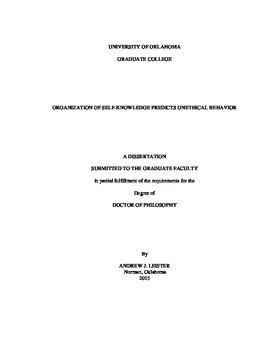| dc.description.abstract | People represent the self (self-structure) using cognitive strategies that either confront (integration) or avoid (compartmentalization) negative self-information (Showers, 1992). Previous research has found that compartmentalization predicts dishonesty on academic performance tasks under neutral conditions in the laboratory (Showers, Thomas, & Grundy, 2015; Thomas, 2015). The current experiments extend this work by using an online paradigm to assess cheating via a coin flip procedure (Bryan, Adams, & Monin, 2013). Here, two experiments seek to replicate the association between compartmentalization and dishonesty under various priming conditions. In Experiment 1, individuals with compartmentalized selves were more dishonest than were individuals with integrative selves, especially under conditions of a “cheater” prime. In Experiment 2, results showed that individuals with integrative selves remained relatively honest compared to individuals with compartmentalized selves even under conditions of greater temptation (money prime). These findings are consistent with the model that individuals with compartmentalized selves defensively avoid negative interpretations of their own behavior. Instead, they may rationalize their dishonesty as normative or even self-enhancing. Conversely, individuals with integrative selves vigilantly process dishonest behavior as having negative implications for the self, thereby motivating themselves to behave more honestly. This model of defensive self-structure lays the framework for a more comprehensive understanding of ethical behavior. | en_US |
